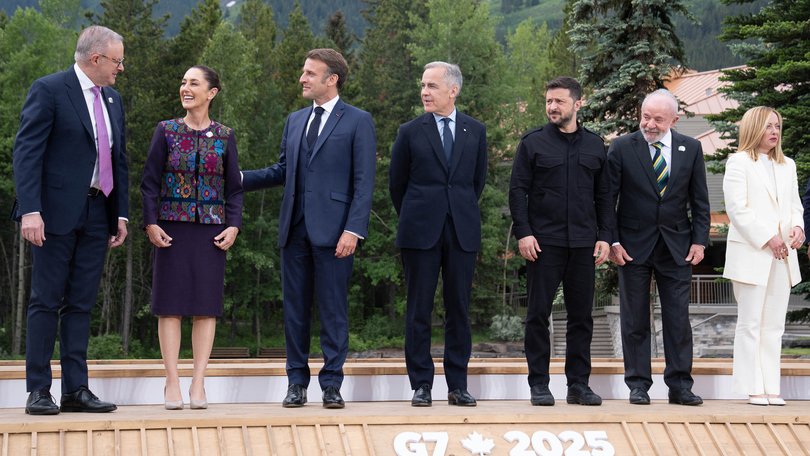Australia ready to benefit from G7’s new critical minerals pact
Resources Minister Madeleine King revealed there would ‘100 per cent’ be more to come on global collaboration to develop the critical minerals market when Anthony Albanese meets Donald Trump.

A new critical minerals agreement with some of the world’s top economies, driven by Australia and Canada at the G7, should open up Australia’s markets to more investment to help turbocharge the industry and start breaking China’s near-monopoly.
Resources Minister Madeleine King said the G7’s action plan would help drive collaboration between the largest economies to invest in the critical minerals vital for military uses and the energy transition.
There would “100 per cent” be more to come on this front when Prime Minister Anthony Albanese meets Donald Trump, the minister revealed.
Sign up to The Nightly's newsletters.
Get the first look at the digital newspaper, curated daily stories and breaking headlines delivered to your inbox.
By continuing you agree to our Terms and Privacy Policy.Critical minerals featured heavily in Mr Albanese’s discussions in Canada with US Trade Representative Jamieson Greer and Treasury Secretary Scott Bessant.
The G7 deal also formalises a push towards a standards-based market that seeks to lift all producers to higher environmental, labour and safety benchmarks — an area where Australia already leads.
“It’s about alternative supply chains, and where we are different is in our standards,” Ms King told The West Australian.
“The security of the modern state, including our own, depends on critical minerals and rare earth elements and the things that they make.
“The energy part is really important, but national security is super important, and that’s why you need the independent supply chain.”
China’s April ban on exports of rare earths and associated magnets underscored the need for other countries to find new supply chains after it upended manufacturers of everything from cars and aircraft to semiconductors and defence suppliers.
Ms King described the export control as a “bureaucratic mirage” that was a ban in all but name.
“When you have cornered the market, that’s within your power, and that’s within China’s power to do that,” she said.
“You’ve got to have that reliable supply, and that’s what we’ve been good at with many other commodities and we can be the same with these ones.”
She said Japan had learned that lesson a decade ago, which led to its investment in Lynas Rare Earths’ operations.
The G7’s critical minerals action plan builds on years of work Australia has led through the International Energy Agency on supply chains and the development of standards-based markets.
G7 countries had all felt the impact of conflict and “unfair competition” on their energy security and supply chains, Mr Albanese told fellow leaders during talks in Canada, leaving their producers struggling to remain competitive.
Canadian Prime Minister Mark Carney said G7 leaders wanted to safeguard against “unfair non-market policies and practices” to end market distortions that hurt workers and businesses.
“This includes de-risking through diversification and reduction of critical dependencies,” he said.
“Leaders welcomed the new Canada-led G7 initiative – the Critical Minerals Production Alliance – working with trusted international partners to guarantee supply for advanced manufacturing and defence.”
Australia’s new critical minerals strategic reserve – promised during the election and now being developed by the Department of Industry, Science and Resources’ experts – will be a key part of this.
“We’re doing it so we can also have a supply, but that supply will be bigger and the market will be more secure and can develop its volume and its resilience if we have the participation of others,” Ms King said, adding that Australia was already talking to several countries.
“To get their money, you’ve got to put your money into it too... So if we step up, they step up alongside us, and we go in this together to create that secure supply chain.”
Wyloo chief executive Luca Giacovazzi said the G7’s action proved the world was watching and that Canada and Australia had “an outsized role” to play in diversifying markets.
“As we race to decarbonise, the solution lies in our ability to form meaningful global partnerships,” he said.
“We have the resources, we have the people, and now, we have the moment to act.”
Association of Mining and Exploration Companies head Warren Pearce said it was good to have global leaders’ meetings looking at these key issues.
“If they do take action, then that will be good for Australia,” he said.
Originally published on The West Australian

